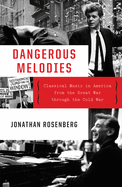
According to historian Jonathan Rosenberg, classical music has little relevance in the contemporary United States. But that wasn't always true. For much of the 20th century, classical music occupied a prominent role in American cultural and political life. In Dangerous Melodies: Classical Music in America from the Great War through the Cold War, Rosenberg explores the surprising ways in which classical music in the U.S. became repeatedly tangled in international politics.
It is a complicated and often ugly story. Music lovers divided into two camps. Musical nationalists found it difficult to separate the country's troubled relationships with Germany, Italy and, later, Russia from those countries' musical heritage. Musical universalists believed that music not only rose above nationalism but could be used to heal schisms between nations. For more than 50 years, the two groups clashed repeatedly over who should be allowed to perform in American concert halls and opera houses and what music they should be allowed to play, forcing the directors of musical institutions to make hard decisions. The music of Beethoven, Brahms, Strauss and Verdi, among others, became the focus of heated debate, and occasional violence. With the advent of the Cold War, the role of music and politics became even more complex as the U.S. government deployed American musicians as ambassadors for "the image of freedom in oppressed countries abroad."
In fact, Rosenberg argues, neither the fears of the musical nationalists nor the hopes of the musical universalists proved true. Still, classical music gave Americans a forum for discussing the nature of loyalty, patriotism, democracy, freedom and oppression. --Pamela Toler, blogging at History in the Margins

